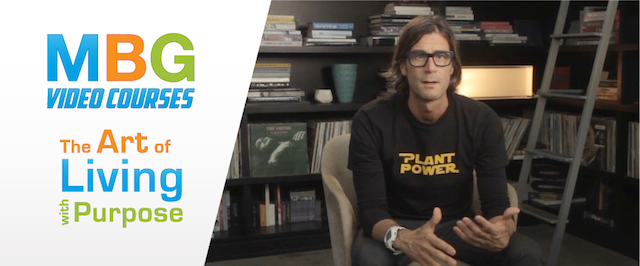Podcast: Play in new window | Download | Embed
You care about the planet, right?
Of course you do. We’re all concerned about global climate change, melting ice caps, fracking, the pollution of our oceans and all the many more issues we currently face that threaten Earth’s long term sustainable health.
As such, we do our best to be good planetary citizens. To keep our carbon footprint light, we eat local, recycle and compost. We opt for the bike and leave the hybrid car in the garage to reduce our fossil fuel dependance. We’ve swapped our lightbulbs for those new expensive ones that for whatever reason are supposed to be so much better. And here in California (and wherever we face drought) we limit our showers and curtail excess water usage.
This is a very positive shift in consciousness. These are all great habits. So go ahead. It’s OK to feel good about yourself. In fact, give yourself a pat on the back for being awesome.
But what if I told you that all of our individual good citizenship efforts are just the tiniest drop in the bucket when compared to the massively deleterious impact of just one particular industry most of us quite simply and unconsciously support on a daily basis every day of our lives?
Whether we are talking about global climate change, the blindingly rapid destruction of our rain forests, over consumption of water, species extinction, the depletion and destruction of our soil, the pollution of our rivers, lakes and oceans or the obliteration of natural wildlife habitats, you might be surprised to discover the very inconvenient and uncomfortable truth that there is one industry single-handedly responsible for destroying and undermining the health and sustainability of our planet far more than any other.
The elephant in the room – animal agriculture.
It is indisputable that our global industrialized system of factory livestock harvesting is unsustainable. It’s killing us and it’s killing the planet. We must embrace this reality and work collectively to create new sustainable systems to feed the 7 billion people that walk the Earth. Because the point of no return is quickly upon us. We’re in the red. If we don’t promptly redirect, it truly will be too late.
When it comes to conservation and ecological responsibility, the dialog generally focuses on fossil fuels. A big issue, of course; and worthy of our attention. But here’s a truth that all too often gets quietly swept under the rug: the deleterious environmental impacts of animal agriculture dwarf the impacts of fossil fuel demand in every single category across the board.
So why aren’t we talking about it?
This is the question explored by Cowspiracy: The Sustainability Secret — an incredibly sobering and powerful upcoming documentary that takes a hard, unflinching look at just why the issue of animal agriculture and its incomprehensibly negative impact fails to get the airtime it deserves in the global environmentalism conversation. Imagine An Inconvenient Truth meets Blackfish and you get the picture.

Today on the podcast I am so excited to have the filmmakers here to tell us all about what is really going on — Keegan Kuhn and Kip Andersen.
We truly are all connected on this small blue planet. And as such, no discussion about individual health in the micro is complete without conversation about global health in the macro. We have a collective responsibility to remove the blinders of denial, take the red pill from the Matrix, understand what is truly at play and marshall our planetary citizenship to catalyze the change this planet, our children and all its inhabitants deserve — before it’s too late.
I sincerely hope this conversation challenges you and gives you something to really ponder. And I encourage all of you to go out and see this film when it comes to a city near you. And as always, let me know what you think in the comments section below.
Peace + Plants,

PS – I will be moderating the post-screening filmmaker Q&A along with Ethan Brown of Beyond Meat at the upcoming Los Angeles premier of the film on June 26. There are still some tickets available, so if you are in the Los Angeles area and want to attend, act quick by clicking HERE and I will see you there! In the meantime, take a peek at the film trailer:
SHOW NOTES
- Buy the Cowspiracy DVD
- Cowspiracy Official Website: www.cowspiracy.com
- Cowspiracy on Facebook: facebook.com/cowspiracymovie
- Cowspiracy on Twitter: @cowspiracy
- Upcoming Screenings
HOW CAN I SUPPORT THE PODCAST?
1. TELL A FRIEND! (Self-explanatory)
2. SHARE ONLINE! (Also self-explanatory)
3. SUBSCRIBE & REVIEW the show on iTunes, Stitcher and Soundcloud and TuneIn.
4. DONATE: Check out the DONATE button on the right hand margin or click HERE to learn more. We even accept Bitcoin!
5. DOWNLOAD THE NEW MOBILE APP! Now you can access, stream, download and share the entire RRP catalog in the palm of your hand on any iOS mobile device (iPhone, iPad and iPod Touch) with our new mobile app. Never miss an episode, plus special announcements, discounts, giveaways. Already downloaded? Awesome. When you have a minute, and it feels right to you, do us a solid and give the app a review in the iTunes Store.
Thanks for listening and thanks for the support!



Another great podcast Rich! Cannot wait for the movie to come out. I listened to this podcast on my way to a baseball game for our local minor league team, The IronPigs. I was inundated with glorification of pork and meat products. The 7th inning race between mascots dressed up as large pieces of pork products and everyone cheering them on was really disheartening. They even have a Bacon 5k race that they hold that seems to merge something healthy with something extremely unhealthy to all. This whole issue seems so overwhelming and hard to do anything about. Hope this movie will help raise some awareness about it.
LIstening to the podcast, one of the filmmakers talks about ocean dead zones and how “massive blooms of algae deprive the fish and other organisms of oxygen.” Algae photosynthesize, and they generate oxygen. The problem is when those massive blooms of oxygen-producing algae die, and then are decomposed by massive populations of bacteria. Decomposing bacteria consume the oxygen. Call this a technicality, but if these guys are doing media for what they admit is an information-rich film, and they are saying to the world that algae deprive XX of oxygen, they’re undermining their own credibility, and the reliability of the film’s information. (FYI, I’m an aquatic ecologist.)
Otherwise, lots to chew into here. This situation needs more publicity and contextualization. Thanks for helping to get it out there.
This was great. At one point in the podcast the guests mention some numbers regarding the difference in impact of a plant based diet to the average American diet – does anyone happen to know where I can find a link for reference on this? Would be a great bundle of numbers to be able to show people.
They should probably also be aware that British Columbia is in fact covered in rainforest, albeit a temperate rainforest of quite different character from what most people consider ‘rainforest’.
Really enjoying this podcast, but deforestation for palm oil is a rainforest issue in areas such as Borneo & Sumatra hence the Rainforest Alliance raising awareness of it on their website. However this interview is fascinating & I can’t wait for the film to hit the UK!
Awesome episode. I really hope this movie gets the attention it needs.
I really think this is one of the most important documentaries to come out in a long time. I just hope that their numbers hold up, cause there are a lot of people who will want to tear this important film apart in order to support the status quo,
Love the podcast but I was a bit concerned with the criticism of Greenpeace in this episode. I had a quick look at the Greenpeace (UK) website and there is quite a bit of stuff relating to animal agriculture and deforestation and campaigns they have / are running. Indeed Greenpeace have been working with the three largest slaughterhouses in Brazil to provide transparency to their supply chain which has resulted in the slaughterhouses cutting off trade with farms damaging the Amazon.
Keegan and Kip said they hadn’t had time to talk to Greenpeace. Maybe they should have done to get a more balanced view.
Despite this, I hope the film gets the exposure it deserves
P+P
Its not that they didn’t have time to talk to Greenpeace — the filmmakers reached out to Greenpeace but Greenpeace refused to be interviewed for the film.
Is the movie coming out to the East Coast? New England? The most important conversation happening right now, bring it out East!
Another Epicsode, Rich! I’m so glad that Keegan and Kip found a way to overcome their fear of the inevitable, and are bringing this film to fruition. Like you, John Robbins, Neal Barnard, Michael Greger, and so many of us who are doing what we can, to inspire consciousness around these topics, this film has the potential to ignite and galvanize the movement. Peace+Plants+Kudos
Dan, I believe that John Robbins’ “Diet for a new America” has many of the numbers.
After a 2’nd listen to RRP91, I’m encouraged that there are others who are optimistic that we’re at or beyond the cow tipping point. It’s these draconian laws, protecting big ag that must go. Rich, I realize this wasn’t your field of expertise, but as someone with plenty of legal acumen, what do you think the most effective approach to reversing these is, in addition to raising peoples’ awareness?
For screening information, visit their website. Sign up for their newsletter for updates on locations, times, etc.
http://www.cowspiracy.com
Hi Charis – nobody is saying that palm oil isn’t a significant issue – it of course is. I believe the point they making is that deforestation for purposes of grazing and food for animal agriculture is a predominant issue that is underrepresented in the overall dialog about rainforest destruction.
I believe the guys are working on building out their website to include all the numbers and the supporting studies – stay tuned.
Really great podcast Rich! You should check out the SHAC 7. They were 7 activists that were charged under the AETA. I know a few of the defendants.
I think the boys are naive, especially with their comments towards the end of the show. If you want results then you need to look to free markets and incentives. The markets just give people what they want and what people want is meat….and lots of it. If more people want healthy food the market will respond in kind. You can see that building now. An example would be all of the nut milks. They’re everywhere now and were nowhere not too long ago. Little by little, ground up, not top down, and don’t make corporations out to be the bad guy. It’s absolving society/consumers of their responsibilities.
Few things get done in this world for selfless reasons, unfortunately. Don’t appeal to “noble” causes of saving rain forests. Few people outside advocacy groups give is s#it in reality. Sure, they’ll say the words, but that’s just talk. What is needed is to appeal to peoples’ taste buds and their desire to live better lives–healthy lives, more fulfilling lives with more energy and vitality to create and to be better parents, spouses, employees, employers, citizens, etc. And to give up a lifestyle of being sick, overweight and financially strained by the massive cost of meds that come with the unhealthy lifestyle. That’s the incentive that will move people away from unsustainable lifestyles, which in turn will be better for the ecology of the planet. The ecological benefits are a natural byproduct, not the other way around. It will never work approaching this from the other side of the equation. Never.
Irony?
What a great episode! I look forward to other episodes focusing on other aspects of veganism besides health.
Using livestock properly, and sustainably, is explained here. http://www.youtube.com/watch?v=vpTHi7O66pI
What about our modern industrial chemical monoculture agriculture does to the environment and wildlife ,and is unsustainable? Millions upon millions of acres of biological deserts mono-cultures of single crops , hundreds of millions of tons of pesticides and herbicides applied every year .virtually none of the original diversity of life left . industrial agriculture , using up and depleting huge aquifers like to Ogallala in the great plains and California’s aquifer to support the giant dead monocultures in the interior Valley.I am not saying our present livestock industry is not a problem or cannot be much better, but what is the alternative ?more mono-cultures of biological deserts, more millions of acres of single species of plants ? At least cattle grazed on native prairie or pasture support ain’t much greater diversity of life. grasslands absorb CO2 and our a sink, plowed farmlands are the opposite.
Sept 10 in Philadelphia – http://www.tugg.com/events/10431
Just got back from a showing of the film in Oakland with friends. Bravo. Thank you and thanks for sticking it out Keegan, Kip & Rich – for getting this made and shown. Big deal. It needs to be shown in Marin County. hmmmm….more later. Thank you, again.
Cowspiracy is nothing short of Amazing. Excellent job. I hope this does to the livestock industry, what Blackfish did to the captive industry. It is time for people to WAKE UP.
Allowing non-native, introduced grazing animals to destroy any land, holds back the potential for re-forestation etc. Cessation in growing crops for farmed animals to eat would free up land that could be re-wilded and all the ecological benefits that ensue. This is assuming we also tackle human population growth. More humans = more need for farm land.
great podcast!